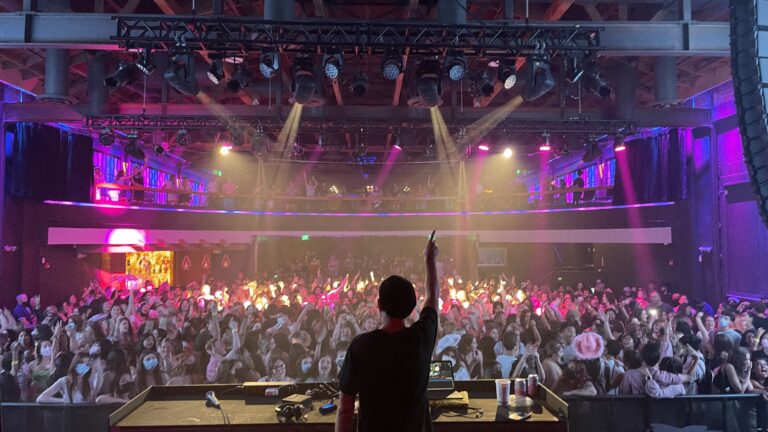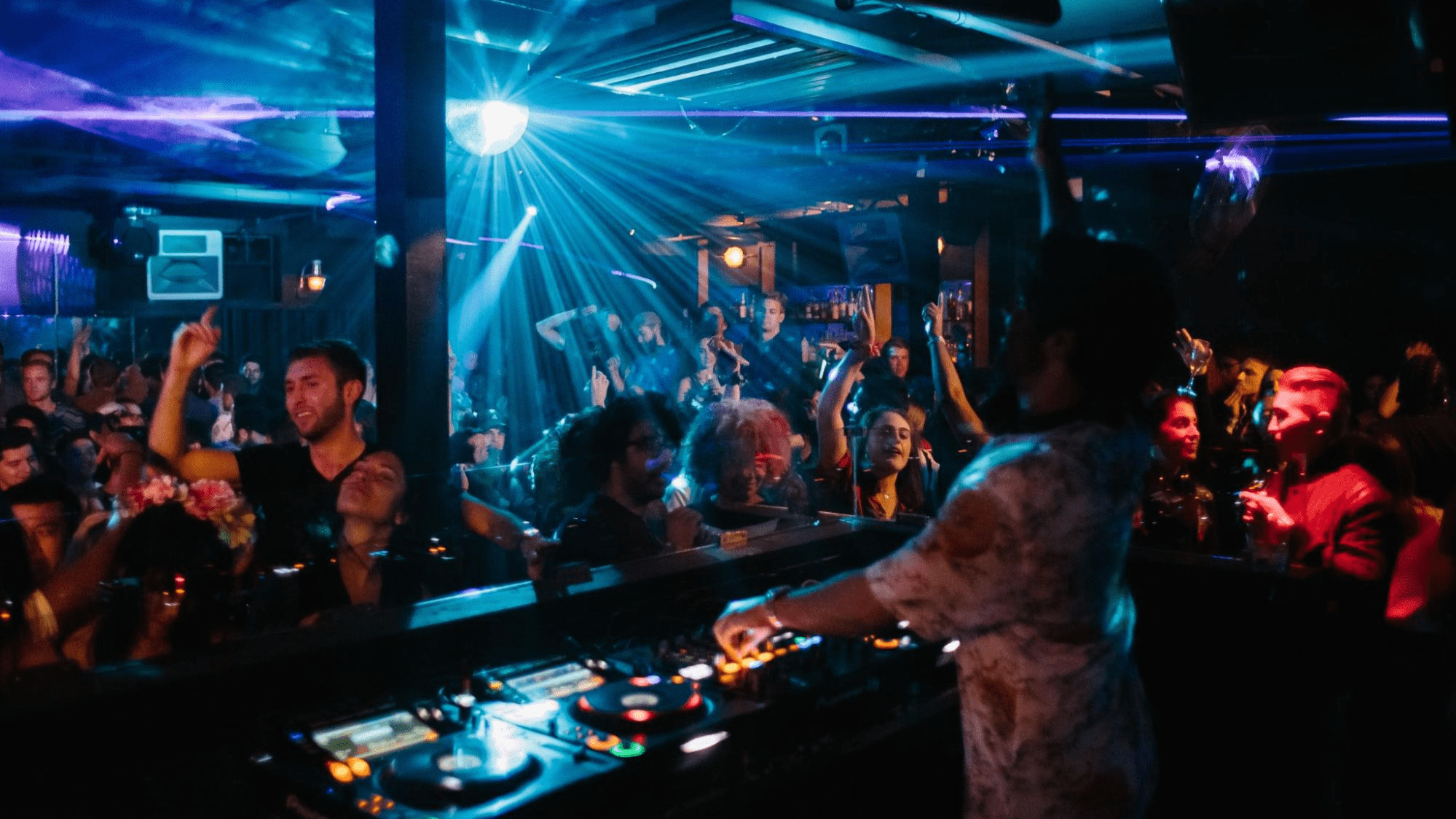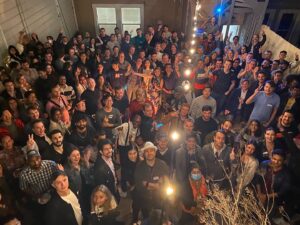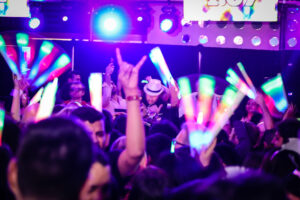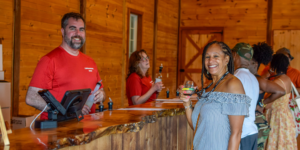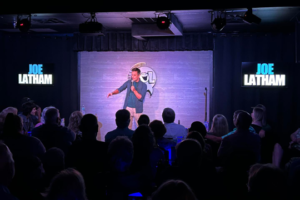Case study highlights:
- Since joining Eventbrite, The Vermont has noticed a significant rise in Google rankings for its events. Eventbrite’s unparalleled SEO domain authority of 93/100 gives our organizers’ events a greater chance of being at the top of search engine results.
- An Eventbrite Ads campaign made $2.01 for every $1 spent (ROAS*). Eventbrite Music organisers who advertise on Eventbrite sell 2.4x more paid tickets when they advertise their events vs when they don’t.**
Hosting live concerts, club nights, and themed parties, The Vermont Hollywood is a 13,000-square-foot entertainment venue, and—as senior marketing executive Sandra Savis tells us—ensuring every space is sold out requires considerable third-party support.
“A ticketing partner is just that—a partner—so we expect them to deliver in terms of exposure, marketing, and driving ticket sales,” Savis explains. “And not just for the venue, but for all the events.”
However, this hasn’t always been the case with previous ticketing partners. Since joining Eventbrite, The Vermont has seen increased discovery, benefitted from all-in-one marketing tools, and thrived with personalized support from a dedicated strategic success partner.
Boosting discoverability and loyalty
Discoverability has improved dramatically since The Vermont joined Eventbrite, with their events now ranking highly on SEO.
“You go to Google and search for an event in Los Angeles, and we appear within the first three options,” explains Sandra. “When we were with other platforms, our events weren’t showing up until page six, and it was killing us.”
Eventbrite’s unparalleled SEO domain authority of 93/100 gives our organizers’ events a greater chance of being at the top of search engine results to connect with attendees looking for things to do.
And talking of awareness-building, 22% of traffic to The Vermont’s organizer page comes via Eventbrite channels.

The Vermont team has found that Eventbrite not only builds awareness around its events but also fosters attendee loyalty. Having launched just two and a half years ago, the way event-goers engage with the venue is changing.
“In the beginning, people were searching for the kind of night they wanted,” Sandra says. “Now, I think people search for our venue. Plus, we have a monthly residency people have gotten to know. We’re still a new venue, but we’re getting out there.”
She adds: “So while Eventbrite’s discovery function is great for people looking for an event, we’re seeing more and more people look specifically at our Eventbrite page to see what’s going on.”
The Vermont uses flexible ticket types, including early bird tickets and promo codes, to appeal to a broader audience. What’s more, Eventbrite’s automated event notifications and emails sent to event-goers who attend, follow, or like events on the platform help keep people coming back.
Using Eventbrite Ads to drive ticket sales
Sandra was partly inspired to switch ticketing partners after witnessing the success that promoters who work with The Vermont were having on Eventbrite.
“These people operate in an incredibly competitive landscape, but they use Eventbrite and host themed parties and club nights at The Vermont that attract 1,000 to 1,200 people,” Sandra explains. “We realized it was working for them, and that’s where we needed to be, especially when an event we were producing wasn’t selling well and needed an extra push.”

Increasingly, that extra push has come in the form of Eventbrite Ads, which Sandra uses specifically for events that aren’t selling tickets as quickly as she’d hoped.
Eventbrite Ads promote events in top placements on the platform’s most highly trafficked areas, including the top of related search results, the homepage, and category pages. It gives organizers the option to choose between campaigns that drive awareness—which prioritizes getting event listings in front of more consumers—or drive traffic, which is all about getting clicks on event listings.
“Some events sell themselves, and that’s great. But for the ones that need additional support—usually in the week of the event—we run the ad tools,” she says. “And we see a definite spike in ticket sales, especially right after placing the ad in the following couple of days.”
The Vermont’s Eventbrite Ads campaign for its Club 90s presents Gaga Night + Pride Party made $2.01 for every $1 spent (ROAS*), and it cost 54 cents each time someone clicked on the ad (CPC*). The campaign ran between May 25, 2024 and June 2, 2024.
Music organizers who advertise on Eventbrite sell 2.4x more paid tickets when they advertise their events vs when they don’t.**
Dedicated support from a Strategic Advisor
It’s not just about creating buzz, either. Sandra has found the personalized, behind-the-scenes support that promoters raved about to be truly invaluable: “They kept telling us that the support is there, and it is!”
Eventbrite’s strategic partners offer proactive guidance to help organizers make the most out of the platform’s broad suite of marketing tools. “Our agent is always available and responds right away,” explains Sandra. “We didn’t have that with our previous ticketing partner, so it’s great to get answers to our questions.”
Grow your events with our marketing tools

Event listings made easy
“Building out events is super easy with Eventbrite,” says Sandra. “When creating new events, we use the AI tool to put together a description and ensure we’re using the right keywords and, for repeat events, it’s an easy duplicate.”
Eventbrite’s AI tool allows organizers to create an event in seconds with just one click. With our “auto-create” functionality, organizers input the event title, date, and location, and the AI tool will generate the summary and description. These AI-driven marketing tools also empower organizers to create compelling content to promote events.

From easy event listings to providing a frictionless checkout experience, Sandra believes this extra layer of convenience has never been more important when faced with a changing nightlife landscape.
“There’s been a shift in the past 10 years within party culture and even within concert culture, and it can be difficult to entice people out of the house for previously highly sought-after events,” she explains.
As a result, Sandra says they need to work hard to market their events to their target demographic of 21- to 35-year-olds and give them a compelling reason to attend.
“We try to offer reassurance and information about the kind of experience they’re going to have—especially when it’s a new venue or a place they’ve never been before,” she says.
Eventbrite’s event listings allow organizers like Sandra to meet this need. Organizers can include descriptions, agendas, and FAQs to communicate valuable information, while video and images help bring events to life. We know attendees are drawn to detailed event listings—traffic to pages with a video is 74% higher than those without.
A thriving partnership with a bright future
The Vermont’s experience since joining the platform demonstrates how powerful a successful ticketing partnership can be at Eventbrite. The platform’s full suite of marketing tools and personalized support have proved just the ticket—and this is just the beginning.
*Definitions:
Return on Advertising Spend (ROAS) measures revenue directly attributed to campaigns, while eROAS measures revenue across the entire business concerning ad spend and is calculated by dividing total revenue across the business by ad spend. Example: $1000 ticket revenue/ $335 advertising budget = 3X return on advertising spend (ROAS).
Click-through rate (CTR) represents the percentage of people who click on an ad compared to the number of people who view it. The average CTR is 1.15% for Facebook Ads, according to a Wordstream report sharing 2024 data.
Cost-per-click (CPC) measures how much advertisers have spent for each time a user clicks on a link. The average CPC is $0.83 for Facebook Ads, according to a Wordstream report sharing 2024 data.
**Based on Eventbrite data of creators who promoted their events with Eventbrite ads between Oct. 1, 2023, and April 1, 2024, comparing their promoted events versus their non-promoted events.
